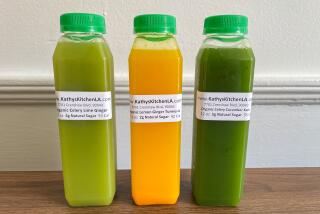Juice Ventures Plans to Double in Size This Year
- Share via
Juice Ventures Inc., the Irvine-based owner of Juice It Up juice bars, plans to double in size this year as it launches an expansion into nine states.
Company officials said they purchased Juice It Up’s North Carolina-based licensee, boosting the company’s store count to 41. In addition, Juice Ventures is planning to acquire its “No. 1 competitor” in Orange County, which company officials declined to name.
Executives at California Juice Stop Corp. of Mission Viejo, which has 33 stores statewide, said they are negotiating with a competitor about a possible merger but would not disclose details.
The fragmented juice-bar business has become intensely competitive in recent years as nearly 1,900 juice bars have sprouted across the nation, mostly in coastal states. Sales are expected to rise to an estimated $647 million this year, from $340 million in 1997.
The big fish in this swelling pond is San Francisco-based Jamba Juice Co., which has more than 220 stores nationwide. If Juice Ventures completes its acquisition, company officials said they would have more than 120 stores by the year’s end, making Juice It Up one of the industry’s biggest players.
While the juice business still is growing, some analysts say the saturation point could be nearing.
“It’s hard to say how long it’s going to last, maybe another three years,” said Rancho Palos Verdes restaurant analyst Janet Lowder. “Five, I think, would be pushing it.”
Juice Ventures President Bruce Holsten disagrees. “That would be like somebody saying back in 1992, we don’t need any more coffee bars,” he said.
As competition has increased, juice bars have rolled out new products, including coffee, soup and bagel sandwiches. Juice It Up is now testing a “dessert smoothie” and a frozen smoothie bar. Some California Juice Stop stores now sell sandwiches.
Consolidation also is taking hold. Jamba Juice bought the 96-store, Utah-based Zuka Juice in February, expanding its operations into new states. Jamba Juice has no stores on the East Coast, where Juice Ventures is expanding.
Privately held Juice Ventures, which was founded in 1995 and had sales of about $7.5 million last year, said its recent acquisition of licensee Blue Sky Juice Co. will fuel its national expansion. Former Blue Sky executives--who have since moved to California--have expertise in finance, real estate development and national distribution, said Holsten, who was president of Blue Sky before taking that title at Juice Ventures.
The company now is talking with potential licensees in Italy, France and Spain, he said.
Juice Stop founder Susan Jespersen opened her first juice bar in Lake Forest in 1994, and “sales went like wildfire,” said Robert Johnson, corporate vice president.
Then known as Juice Stop Franchising Corp., the company expanded and by 1997 had about 70 stores, Johnson said. Jespersen and her son-in-law split the business in 1997. He kept the name and moved to Denver, Johnson said.
The renamed California Juice Stop expanded again. The company, which had sales of about $5 million last year, recently opened stores in Ventura and Torrance and is now building one in San Diego.
The company is toying with the idea of opening mini juice bars, which would be one-fourth to one-half the size of its regular juice bars and could be installed in kiosks inside malls, Johnson said.
The first fruit-drink chain--Orange Julius--was born in 1926, when Willard Hamlin, a real estate broker with a penchant for chemistry, helped open a downtown Los Angeles lunch counter. Hamlin was approached by a man named Julius Fried, who was seeking a site to sell freshly squeezed orange juice. But the acidity of the juice upset Hamlin’s stomach and he suggested adding something to it. The ingredients that were added included crushed ice, syrup and some “pure food products” powder that was based on Hamlin’s concoctions.
Morning banter at Fried’s stand--”How about an orange, Julius?”--led to the company’s name.
Orange Julius later grew into a chain of 700 juice stands in eight countries.
The modern version of a juice bar opened in April 1990 in a San Luis Obispo shopping center where Kirk Perron, an “avid workout guru” whose mom made smoothies, opened the first Juice Club.
Billed as “a healthy alternative to fast food,” the store was a hit with locals, joggers and bicyclists, said Pam Orozco, an early customer who now is the store manager.
As juice businesses began to proliferate, Juice Club wanted a more unique moniker and renamed itself Jamba Juice in 1997.
Jamba Juice smoothies, which sell for about $3.50, are made with fruit juice, quick-frozen fruit and yogurt, sherbet or sorbet. Each smoothie gets one free nutritional supplement. There are six “juice boosts” to choose from.
In a trend that’s been reflected throughout the industry, Jamba Juice has expanded its offerings over the years. It now sells “high nutrition” bread squares in four flavors, which now represent about 4% of the San Luis Obispo store’s sales.
More to Read
Inside the business of entertainment
The Wide Shot brings you news, analysis and insights on everything from streaming wars to production — and what it all means for the future.
You may occasionally receive promotional content from the Los Angeles Times.










